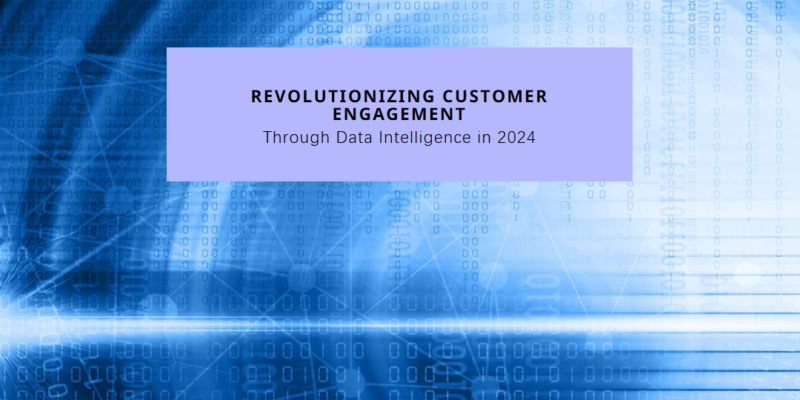
In the rapidly evolving landscape of 2024, data intelligence stands at the forefront of transforming customer engagement strategies. This technological advance is not limited to one industry but sprawls across gaming, media and entertainment, eCommerce, banking and insurance, transport and logistics, talent management, customer relationship management (CRM), enterprise software as a service (SaaS), and even e-governance. Companies like P99Soft are leading this revolution, harnessing data intelligence cloud for B2B interactions and promoting a data-driven democracy that informs strategic decisions across these diverse sectors.
1. Gaming Industry: Enhancing Personalization and Player Retention
In the gaming sector, data intelligence enables companies to create highly personalized gaming experiences. By analyzing player data, companies can tailor game content to individual preferences, improving engagement and retention. In 2024, gaming companies utilize player behavior analytics to optimize game design and monetization strategies, significantly enhancing user engagement and increasing revenue streams.
2. Media and Entertainment: Curating Content with Precision
For media and entertainment, the focus is on content recommendation algorithms that enhance viewer satisfaction and retention. Services like Netflix and Spotify have been pioneers in this area, and by 2024, these methodologies have only become more refined. Data intelligence allows for analyzing viewing habits, which in turn helps in curating personalized content playlists, thus keeping the audience engaged and subscribed.
3. eCommerce: Revolutionizing Customer Experience
In eCommerce, customer engagement strategies fueled by data intelligence focus on personalizing shopping experiences to increase conversion rates. By understanding consumer behavior through data analytics, retailers offer targeted promotions and products that meet the specific needs and desires of their customers. P99Soft’s solutions in data intelligence help retailers by providing insights into customer preferences and market trends, enabling them to stock products more effectively and design marketing campaigns that resonate with their audience.
4. Banks and Insurance: Customizing Financial Solutions
The banking and insurance sectors benefit from data intelligence by offering customized financial products to their clients. Insights derived from customer data allow for the development of personalized insurance packages and banking services, enhancing customer satisfaction and loyalty. Moreover, predictive analytics helps in identifying potential fraud, thus safeguarding both the provider and the customer.
5. Transport and Logistics: Optimizing Routes and Inventories
In transport and logistics, data intelligence transforms operations through route optimization and inventory management. Real-time data analysis helps in predicting delivery times more accurately, managing inventories efficiently, and thus reducing operational costs. This not only improves service delivery but also enhances customer satisfaction by ensuring timely deliveries and minimizing disruptions.
6. Talent Management and CRM: Streamlining Human Resources and Customer Services
Talent management systems utilize data intelligence to optimize hiring processes and retain top talent. By analyzing employee data, companies can improve their HR strategies, enhancing employee satisfaction and productivity. Similarly, in CRM, data intelligence is used to predict customer needs and tailor services accordingly, which significantly enhances customer relationship management and retention.
7. Enterprise SaaS and E-Governance: Driving Efficiency and Transparency
Enterprise SaaS providers leverage data intelligence to enhance the functionality and efficiency of their software solutions, offering more effective business management tools. In the realm of e-governance, data-driven strategies ensure more transparent and responsive public services, making governance more efficient and accountable.
Enhanced Real-Time Interactions
In sectors like gaming and entertainment, real-time data processing capabilities have taken customer interactions to new heights. Gaming companies are now using data intelligence to adjust game environments and challenges in real-time based on player performance and feedback. This dynamic adjustment helps maintain player interest and prolongs session times by continuously providing challenging yet achievable goals.
Predictive Customer Behaviors
Media companies are advancing beyond simple recommendation systems to predictive analytics that anticipate future content preferences based on current consumption trends and peer influences. This forward-thinking approach allows companies to not only keep viewers engaged with existing content but also to strategically plan and produce future content that is likely to be successful, optimizing both resources and viewer retention rates.
Dynamic Pricing Models
ECommerce giants and retailers are increasingly adopting dynamic pricing models powered by data intelligence. By analyzing customer data, market trends, and inventory levels, these platforms can adjust prices in real-time to maximize profits and attract more customers. This approach is especially effective during high-traffic periods like holidays or sales events, ensuring competitive pricing that benefits both the business and the consumer.
Risk Assessment and Management
In the banking and insurance sectors, data intelligence has revolutionized risk management. Financial institutions are now able to offer tailored products that not only meet the specific financial needs of individuals but also align with their risk profiles. This personalized risk assessment helps in mitigating potential losses while optimizing the profitability of financial products offered to diverse customer bases.
Supply Chain Optimization
Transport and logistics have seen significant advancements with the integration of IoT and data intelligence. Companies are now able to track shipments in real-time and predict potential delays or disruptions. This data-driven approach allows for preemptive action to be taken, such as rerouting shipments or adjusting schedules, thereby reducing downtime and increasing overall supply chain reliability.
Employee Performance Analytics
In talent management, data intelligence tools are being used to track and analyze employee performance continuously. This allows for real-time feedback and personalized development plans for employees, fostering a productive work environment. Additionally, predictive analytics are used to identify potential leadership candidates within the organization, aiding succession planning and career development.
FAQs
- How does data intelligence improve customer engagement in gaming? Data intelligence allows for the analysis of player behavior, which aids in customizing games to fit individual preferences, thus enhancing engagement and retention.
- What role does data intelligence play in the media and entertainment sectors? It primarily improves content recommendation systems, ensuring that viewers receive personalized content suggestions that match their preferences.
- Can data intelligence impact the effectiveness of eCommerce promotions? Yes, by analyzing customer data, eCommerce platforms can tailor promotions to specific segments, increasing the relevance and effectiveness of marketing campaigns.
- How does data intelligence benefit the banking sector? It enables the creation of personalized financial products and enhances fraud detection systems, thus improving both customer service and security.
- What improvements does data intelligence bring to transport and logistics? It enhances route optimization and inventory management, leading to more efficient operations and improved customer satisfaction.
Conclusion
As we move through 2024, the impact of data intelligence across various sectors is profoundly evident. By enabling more personalized and efficient customer engagement strategies, it not only boosts profitability but also enhances customer satisfaction across the board. Companies are at the helm of this transformation, providing tailored data intelligence solutions that cater to a wide array of industries. As industries continue to evolve, one might wonder, what will be the next big breakthrough in data intelligence technology?
Also know about








